Ashford Steam Centre facts for kids
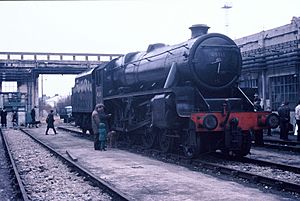
Black Five 45110 at Ashford Steam Centre
|
|
| Lua error in Module:Location_map at line 420: attempt to index field 'wikibase' (a nil value). | |
| Established | 1968 |
|---|---|
| Dissolved | 1976 |
| Location | Willesborough, Ashford, Kent TR 021 416 |
| Type | Operational railway museum |
| Founder | Esmond Lewis-Evans |
| Owner | British Railways Board |
The Ashford Steam Centre was a special place for old trains in Willesborough, Ashford, Kent, United Kingdom. It was like a museum where you could see and sometimes even ride on steam locomotives. The centre was located near the main Ashford railway station. It opened its doors in 1968 and closed eight years later in 1976.
Contents
A Look Back: The History of the Steam Centre
The Ashford Steam Centre was started by a person named Esmond Lewis-Evans. It was set up in an old engine shed. An engine shed is like a garage for trains. This particular shed was built in 1931. It had a railway turntable (a spinning platform to turn trains around), a coaling stage (where coal was loaded), and a water tower (to fill steam engines with water).
Steam trains stopped using this shed in 1962. After that, it was used for diesel locomotives, which are trains that run on diesel fuel. The steam centre opened in 1968, bringing steam trains back to life there. In 1971, a special train trip called the Man of Kent '71 even visited the centre.
By 1974, the centre was open once a month for visitors. It had about twelve different trains on display. However, the centre faced money problems. Because of these debts, it had to close in May 1976. All the trains and other railway items were moved to different places. The old engine shed was taken down in 1989. Today, much of the area where the centre once stood has been used for new houses.
Amazing Trains and Carriages
The Ashford Steam Centre was home to many interesting trains and railway carriages. Here are some of the cool items that were once based there.
Locomotives: The Powerful Engines
| Type of Train | How it Moved | Name or Class | What Happened to It | Picture |
|---|---|---|---|---|
| SECR | 0-6-0 | C Class | This engine, No 592, moved to the Bluebell Railway after the centre closed. | 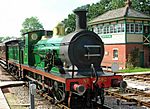 |
| SECR | 0-4-4T | H Class | Engine No. 263 was painted green. It also moved to the Bluebell Railway after the centre closed. |  |
| SR | 4-6-2 | Merchant Navy | This was No 35028, named Clan Line. It was painted in British Railways green. | 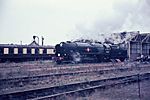 |
| SR | 4-6-0 | N15 Class | This engine was No 777, called Sir Lamiel. | 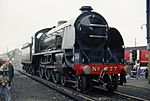 |
| LMS | 4-6-0 | Black Five | Engine No. 45110 was painted black. | 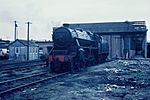 |
| CF du Nord | 4-6-0 | 3.513 | This French engine, No 3.628, came from France in the 1970s. It later went to the Nene Valley Railway. It is now being restored in France. | 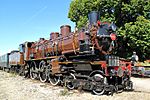 |
| NSB | 2-6-0 | NSB Class 21c | This was No. 376, named King Haakon VII. | 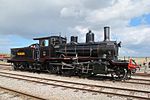 |
Multiple Units: Trains with Many Cars
| Type of Train | Class | What Happened to It | Picture |
|---|---|---|---|
| SR | 4DD | This was Unit No. 4902, painted blue. It had three cars. One car was later scrapped. | 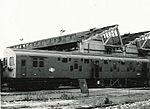 |
| SR | 5BEL | This was a special Pullman dining car called Audrey. It later became part of the famous Venice-Simplon Orient Express. | 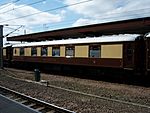 |
Carriages: Where Passengers Sat
| Type of Train | Number | Kind of Carriage | What Happened to It | Picture |
|---|---|---|---|---|
| Pullman | No 243 | Parlour First | This carriage was named Lucille. It was built in 1928. After the centre closed, Lucille was sold in 1985 to be used on the Venice-Simplon Orient Express. | 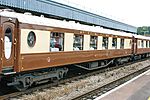 |
| Pullman | No 306 | This carriage was named Orion. It was built in 1951. It later moved to Pecorama in Beer, Devon. | 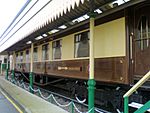 |

